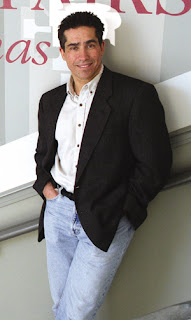
Earlier this year, the head of the Evangelical Theological Society, Francis Beckwith, announced that he'd re-entered communion with the Roman Catholic church.
For many Protestant Evangelicals, this move was tantamount to apostasy, and the uproar over this guy has, at times, been deafening.
This morning an acquaintance forwarded to me an interview with Beckwith where Beckwith talks about some of the reasons he went back to the Church of Rome after so many years away.
It's worth looking at, and I welcome a good discussion around the issues he brings up. Of particular interest to me is his discussion of Justification and his argument regarding the early Church Fathers.

5 comments:
He's definitely right in saying that the reformed doctrine is not found in the Fathers... on the other hand, neither is that of the Council of Trent. The Fathers are not particularly interested in the obscure theological questions to be raised over 1000 years in the future. They had their own heresies to combat (some more obscure than others). The same goes for the Apostles.
All of this rationalized (or 'systematic') theology seems rather silly to me, anyway. It makes much more sense to take the view of an intellectual historian. On the question of Justification, someone like N.T. Wright seems to be headed in the best direction. The reformers and counter-reformers had their own agendas, to be sure, but let's have a look at what the Apostles or Fathers might have had in mind when they were writing. If our conclusions disagree with the cherished creeds of the 16th century, so be it.
More importantly, what's with this frou-frou picture!? Some things are better left to the imagination.
I think what Wright has to say about justification is tremendously important and helpful. He's not denying the protestant emphasis on that doctrine, but rather he's pointing us to a larger/more holistic view (his phrase: grand narrative) of what the salvific implications are for Paul as a first century Jew. So it's not that the forensic reformed view of justification is wrong, per se, it's just that it's too narrow, as if they've gone insane around one idea. As Wright likes to say (and here I'm paraphrasing), "it's not believing in justification by faith alone that saves you, it's faith in Jesus."
That being said, I don't know that this means we ought to "cross the Tiber" (as a friend said) and go back to Rome. I'd like to hear Beckwith's thoughts on Papal infallibility, Mariology and indulgences. He does comment on indulgences in a way that would seem to indicate that he thinks they're okay, but I think the Protestant church has some legitimate complaints there. Perhaps he takes Mark Noll's conjecture to heart. . .that the reformation might essentially be over.
As far as the Fathers go, I want to hear more about your idea of the "intellectual historian." What do you mean by that?
And yes, those are some nice "evangelical" jeans. . .apparently his wardrobe hasn't "converted" yet. =)
I'm thinking of 'Intellectual History' simply as the history of ideas (http://en.wikipedia.org/wiki/Intellectual_history) I would classify the Bishop of Durham as an historian in this sense, as opposed to a systematic theologian. Maybe the term is 'Historical Theology'. His magnum opus series on Christian origins is the perfect example.
I hear that many of these high-profile Protestant converts (Scott Hahn etc.) have caused serious headaches for the RC heirarchy. They come up with their own ideas about Catholicism very quickly (I suppose they believe the Spirit leads them, in accordance with their evangelical background and predisposition), make lots of headlines, and the next thing you know they're the new face of the RC church. I'm surprised Beckwith wasn't more familiar with scholarly work on this subject, and his first exposure to it was of the "Rome Sweet Home" variety.
oh, yes, it is called "Historical Theology." Actually what I'm thinking of focusing on. . .along with Biblical Theology. It's a toss up between those two. Which is why I like Hays and Wright. I think they essentially do more of that sort of thing.
Post a Comment